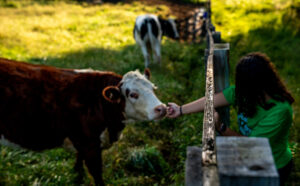CHEVY CHASE, MD (August 13, 2020) - A new survey commissioned by National 4-H Council finds that teens are feeling angry, overwhelmed and stressed about the current state of social unrest in the country. Eighty-three percent of teens surveyed acknowledged that systemic racism is an issue in the U.S. with nearly half of Black and Hispanic teens noting they worry they could be treated differently because of their race. The survey, conducted in July 2020, is one of the first to examine the impact of racism and the call for social justice on teens today.
The survey, which polled 1,000 youth between the ages of 13-19 nationwide, was commissioned by National 4‑H Council and conducted by The Harris Poll to gain a deeper understanding of teens perspectives on racism and their opinions on the current protests and social justice movement.
Key findings from the survey include:
- Black and Hispanic teens are much more likely to have experienced mistreatment because of their race, with Blacks being especially likely to fear for their safety.
- Teens are rallying around the issue, with 86% saying they are "proud that people are taking a stand protecting against racism" and two-thirds saying they "need people to hear their voice about racism." This is particularly true for Black (82%) and Hispanic (76%) teens who are looking to be heard.
- 3 in 4 teens have taken action against racism, either via conversation or demonstration.
- Teens are calling for racism education in school and government reform to create more equal access as avenues for long-term change.
- 82% of teens acknowledge "there is still so much work to be done in the fight against racism, this is just the start."
- 70% of teens (81% Black) feel encouraged that the current movement and protests will lead to less racism in the U.S.
"I'm encouraged to see how eager today's youth are to be engaged and have a seat at the table when it comes to protecting against racism and creating equal access for all," said Jennifer Sirangelo president and CEO, National 4-H Council. "As the nation's largest youth development organization, 4-H believes that young people, no matter their beliefs, background, or color of their skin, can create positive change in their communities today and deserve the opportunity to prepare for life and work with meaning, purpose and positive impact."
"Now that there is growing momentum around the social justice movement and making real, positive change for our country, it's my responsibility and others of my generation to make sure the conversation continues and that there's real action," said Kalani Washington, 4-H'er from Georgia. "It's inspiring to see youth from all across the U.S. from different backgrounds and beliefs coming together to make opportunity for all a reality."
With annual programs including the True Leaders in Equity Institute and Citizenship Washington Focus, 4-H, powered by Cooperative Extension, a community of more than 100 public universities across the nation, aims to create equity and opportunity for all young people to become leaders and voices on these important issues.
For more information about the survey and 4-H visit 4-H.org.
About 4-H
4-H, the nation's largest youth development organization, grows confident young people who are empowered for life today and prepared for career tomorrow. 4-H programs empower nearly six million young people across the U.S. through experiences that develop critical life skills. 4-H is the youth development program of our nation's Cooperative Extension System and USDA and serves every county and parish in the U.S. through a network of 110 public universities and more than 3000 local Extension offices. Globally, 4-H collaborates with independent programs to empower one million youth in 50 countries. The research-backed 4-H experience grows young people who are four times more likely to contribute to their communities; two times more likely to make healthier choices; two times more likely to be civically active; and two times more likely to participate in STEM programs.
Learn more about 4‑H at 4-H.org, find us on Facebook at Facebook.com/4‑H and follow us on Twitter at Twitter.com/4H.
















